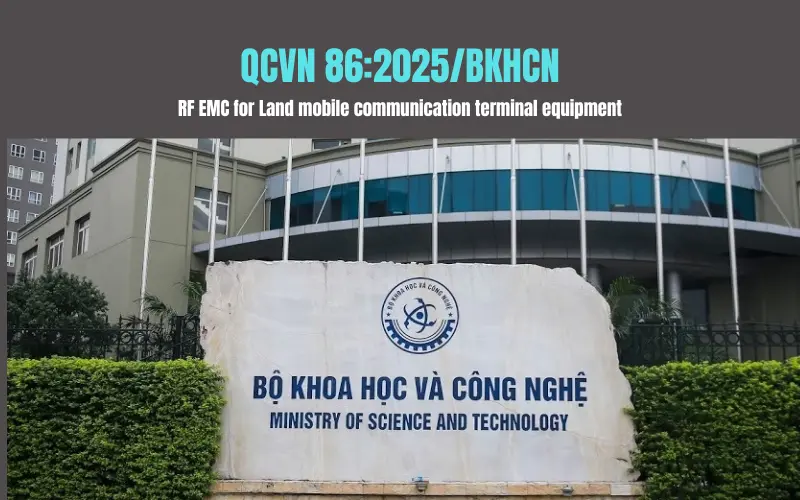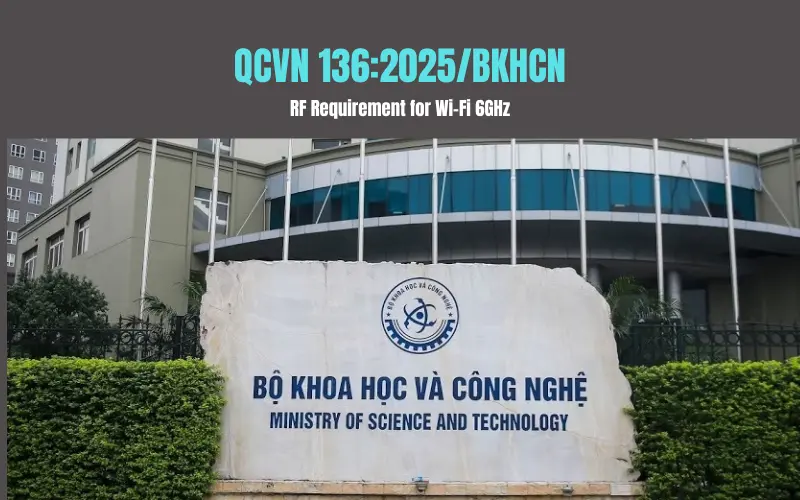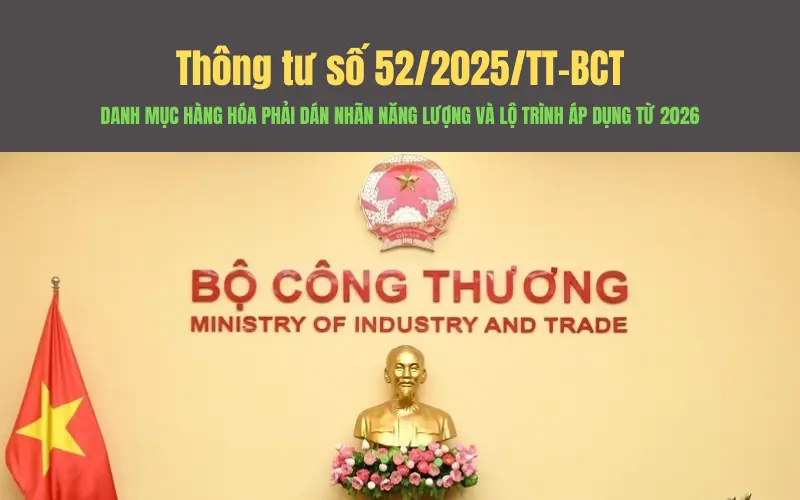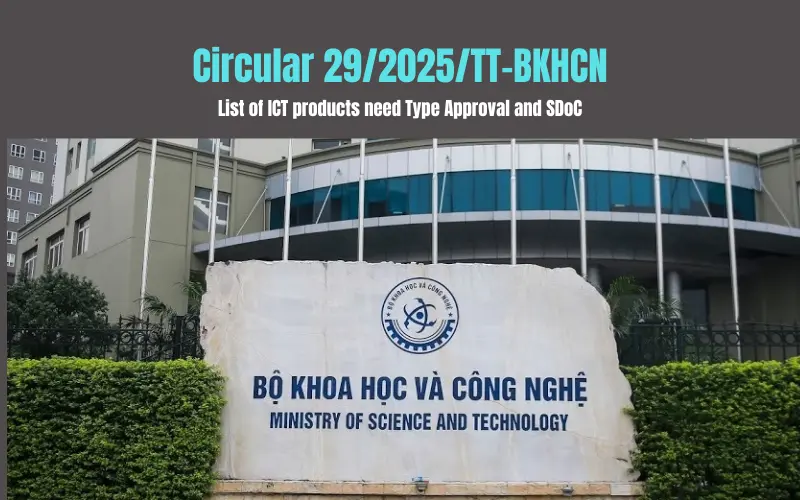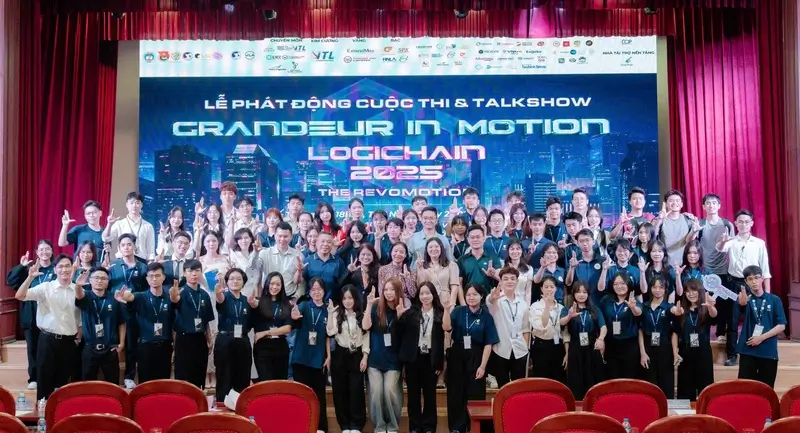The Law amending and supplementing a number of articles of the Law on Standards and Technical Regulations has just been passed by the National Assembly on June 16, 2025, and is expected to take effect from 2026. The revised Law on Standards and Technical Regulations is attracting special attention from the business community, conformity assessment organizations, and experts in the field of quality management. With a wide scope of adjustment, including amending 31 articles, adding 11 new articles and abolishing 23 old articles, this draft not only shows the determination to reform administrative procedures but also shows a strategic vision in upgrading Vietnam's standards ecosystem in the direction of modernity. harmonize with international practices and support the development of the digital economy.
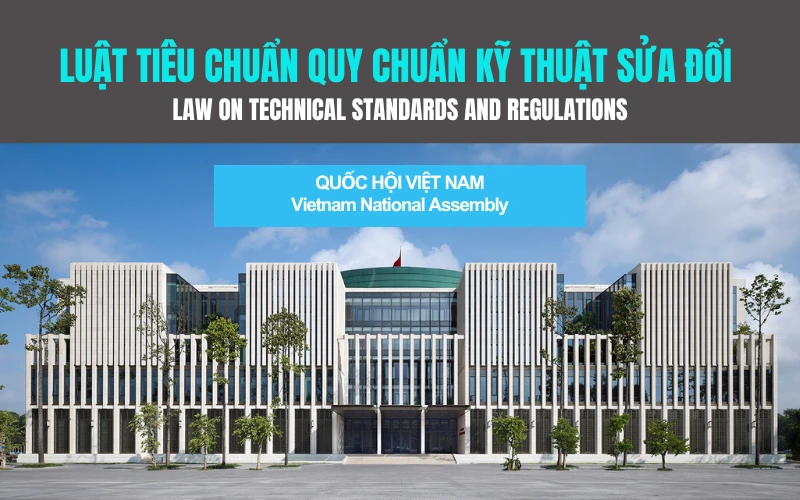
Abolition of overlap in declaration of conformity
One of the breakthroughs of the draft is the exemption from declaration of technical-regulation conformity for products, goods and services that have fully met the quality management requirements in accordance with specialized laws (Clause 1, Article 69a). This is a breakthrough improvement to remove the current overlapping situation, when businesses have to carry out two conformity assessment processes for the same product: one according to national technical regulations, the other according to the provisions of specialized laws (such as the Law on Food Safety, etc Pharmacy Law, Traffic Law, etc.).
Cutting out this duplicate process not only helps businesses save costs and time, but also ensures transparency and consistency in the application of the law. In particular, this new regulation is in line with the modern management trend of gradually shifting from pre-inspection to post-inspection, encouraging self-responsibility of enterprises instead of spread administrative control.
Recognition of international conformity assessment results
Pursuant to Article 48, the Law is amended to expand the grounds for declaration of technical-regulation conformity, including:
- The result of the certification of technical-regulation conformity of the designated certification organization shall comply with the provisions of law.
- The result of the certification of technical-regulation conformity of the certification organization shall be recognized or registered in accordance with the provisions of law.
- Self-assessment results of organizations and individuals on the basis of test results of testing organizations recognized or appointed in accordance with law.
- The results of the conformity assessment of foreign organizations shall be mutually recognized through the MRA, or unilaterally recognized according to the provisions of Article 57.
This is important in the context of Vietnam's increasingly deep integration with new-generation FTAs such as CPTPP, EVFTA, RCEP. Acknowledging the results of international conformity assessments not only reduces the cost of retesting, but also improves the competitiveness of Vietnamese goods, while avoiding the risk of Vietnam being considered as setting up unnecessary technical barriers.
>>> See more: ICT compliance strategy for the period of 2025 ~ 2026
Comprehensive digitization of the conformity announcement process
The draft requires all organizations and individuals to make the announcement of standard conformity and declaration of technical-regulation conformity to register on the National Database on Standards, Measurement and Quality (Clause 2, Article 45, Clause 2, Article 48). The disclosure dossier will include information identifying the announcing organization, products, applicable standards/regulations, legally responsible persons, and conformity assessment results.
Compared to the previous method of submitting documents directly or by post, the new regulation helps to make the disclosure process transparent, allowing the management agency to quickly access and check information when necessary. At the same time, digitization also creates conditions for data interconnection between ministries and sectors, serving post-inspection, inspection, specialized examination and market management more effectively.
Principles for development and application of standards – regulations
This amended law also adds a series of new definitions of testing, assessment, certification of use value, national standards, international standards, and basic standards. Thereby, clearly delineating the concept, scope and principles of developing standards and regulations:
- The standard is voluntary, unless invoked in a regulation or legal document;
- Regulations are mandatory documents to be applied, issued by state agencies on the basis of risk assessment, multi-dimensional consultation and harmonization with international standards.
In addition, the draft encourages the development of national technical standards for priority areas such as high technology, digital transformation, defense and security products, export-oriented goods and goods circulating in ASEAN/EU.
Expanding the definition of conformity assessment organization
In Articles 50~52, the Law on Standards and Technical Regulations amends and replaces the definition of "conformity certification organization" with the definition of "conformity assessment organization" with a broader connotation, including testing, inspection and certification activities. Conformity assessment organizations will have to meet more stringent conditions in terms of capacity and obligations. In particular, the obligation: "Compensation for damage incurred to organizations and individuals requesting conformity assessment in accordance with the provisions of civil law in case of providing wrong conformity assessment results;"
In addition, the use of standard conformity certificates, standard conformity marks, technical-regulation conformity certificates and technical-regulation conformity seals are also more clearly regulated. Accordingly, it includes the conditions of use, the traceability mechanism, and the process of recalling the seal when detecting violations.
The new law serves as a launching pad for businesses in the new era
The Law on Amendments and Supplements to the Law on Standards and Technical Regulations demonstrates political determination and long-term vision in building a transparent, synchronous, internationally integrated and socio-economic development system. The elimination of overlap, the digitization of processes, the recognition of international results and the securing of implementation resources are key factors for the law to truly come to life.
In order to ensure effective implementation, state management agencies need to soon issue decrees and circulars guiding in detail and have a clear transition roadmap, in order to create maximum convenience for the business community and organizations to assess the conformity in the implementation process.
Full text of the Law amending and supplementing the Law on Standards and Technical Regulations
| NATIONAL ASSEMBLY | SOCIALIST REPUBLIC OF VIETNAM |
| Law No. .../2025/QH15 |
|
| DRAFT |
|
LAW
AMENDING AND SUPPLEMENTING A NUMBER OF ARTICLES OF THE LAW ON STANDARDS AND TECHNICAL REGULATIONS
Pursuant to the Constitution of the Socialist Republic of Vietnam;
The National Assembly promulgates the Law amending and supplementing a number of articles of the Law on Standards and Digital Regulations No. 68/2006/QH11 which has been amended and supplemented a number of articles under Law No. 35/2018/QH14.
Article 1. Amending and supplementing a number of articles of the Law on Standards and Technical Regulations
1. Article 3 is amended as follows:
"Article 3. Interpretation of terms
In this Law, the following terms shall be construed as follows:
1. Standards mean regulations on technical characteristics and management requirements used as standards for classifying and evaluating products, goods, services, processes, environment and other objects in socio-economic activities.
The standard is published in written form by an organization for voluntary application.
2. Technical regulation means a regulation on the limit of technical characteristics and management requirements that products, goods, services, processes, environment and other objects in socio-economic activities must comply with in order to ensure safety, hygiene and human health; protection of animals, plants and the environment; protect national interests and security, consumer rights and other essential requirements to ensure compliance with Vietnam's relevant commitments in international treaties and not create unnecessary barriers to trade.
Technical regulations are promulgated by competent state agencies in the form of documents for compulsory application.
3. Activities in the field of standards means the formulation, announcement and application of standards, assessment of conformity with standards.
4. Activities in the field of technical regulations means the formulation, promulgation and application of technical regulations, assessment of conformity with technical regulations.
5. Conformity assessment means the identification of objects of activities in the domain of standards and objects of activities in the domain of technical regulations in conformity with technical characteristics and management requirements specified in the corresponding standards and corresponding technical regulations.
Conformity assessment includes activities: Testing; appraise; certification of use value; inspection and confirmation; certificate of standard conformity; certificate of conformity; accreditation and conformity assessment activities are used with other terminology under specialized law.
6. Testing means the determination of one or more characteristics of an object operating in the field of standards and technical regulations according to a certain process.
7. Assessment means the inspection and determination of the conformity of objects operating in the field of standards and technical regulations with specific requirements or general requirements.
8. Confirmation of use value means the certification of the reasonableness of the declaration of conformity related to the intended use purpose for the expected or expected result through the provision of evidence proving that the requirements are fully fulfilled in accordance with standards and technical regulations.
9. Confirmation inspection means the confirmation of the accuracy of the declaration of conformity in relation to the event that has occurred or the results achieved through the provision of evidence proving that the requirements have been fully fulfilled in accordance with standards and technical regulations.
10. Certification means the assessment and certification of objects of activities in the field of standards and technical regulations in conformity with corresponding standards and technical regulations.
11. Certificate of conformity means the assessment and certification of objects of activities in the field of standards in conformity with corresponding standards.
12. Certification of technical-regulation conformity means the assessment and certification of objects of activities in the field of technical regulations in conformity with corresponding technical regulations.
13. Accreditation means the certification of a conformity assessment organization that has the capacity to conform to the corresponding standards.
14. Conformity assessment organization means an organization that conducts conformity assessment activities specified in Clause 5 of this Article, except for accreditation activities.
15. Announcement of standard conformity means the announcement by an organization or individual of an object of activity in the field of standards in conformity with the corresponding standard.
16. Announcement of technical-regulation conformity means the announcement by an organization or individual of an object of activity in the field of technical regulations in conformity with the corresponding technical regulation.
17. National standard means a standard promulgated by a competent state agency in accordance with the order and procedures specified in this Law.
18. International standard means a standard published by an international standards organization or an international organization operating in the field of standards.
19. Regional standard means a standard announced by a regional standardization organization or a regional organization operating in the field of standards.
20. Foreign standards are standards announced by foreign national standards organizations or foreign associations, associations and specialized research institutes.
21. Grassroots standards are standards announced by state agencies, economic organizations, non-business units and socio-professional organizations to apply to activities within the scope of such organizations.
22. National standards agency means a national-level focal point on standards and a national representative participating in corresponding international and regional standards organizations.
23. Technical barriers in trade are compulsory technical measures applied to ensure safety, hygiene and human health, protection of animals, plants and the environment; protection of national interests and security, interests of consumers, specified in technical regulations, standards are invoked in technical regulations, legal documents or conformity assessment processes promulgated by competent state agencies.".
2. To amend and supplement Clause 2, Article 4 as follows:
"2. Technical regulations promulgated together with circulars of ministers, heads of ministerial-level agencies, decisions of People's Committees of centrally-run cities are documents in the system of legal documents promulgated by competent agencies in accordance with the Law on Promulgation of Legal Documents. The order and procedures for planning, formulation, opinion collection, impact assessment and appraisal of technical regulations shall comply with the provisions of this Law.".
3. Article 5 is amended as follows:
"Article 5. Objects of activities in the field of standards and activities in the field of technical regulations
1. Subjects of activities in the field of standards and activities in the field of technical regulations include:
a) Products and goods;
b) Services;
c) Process;
d) Environment;
dd) Other subjects in socio-economic activities.
2. The Government shall detail this Article.".
4. Article 6 is amended as follows:
"Article 6. Basic principles of activities in the field of standards and in the field of technical regulations
1. Standards and technical regulations are fundamental state management tools, applied in all fields of socio-economic life in order to ensure the safety and quality of products, goods, services, processes and environment; promote innovation, improve productivity, national competitiveness, people's quality of life and international integration.
2. The state operation and management in the field of standards and technical regulations shall comply with the principles of the State-oriented, the main market, the enterprise as the center and the active participation of society; as a tool for socio-economic development orientation, must be consistent with the development viewpoint, governance mode and innovation orientation of the country; ensure publicity, transparency, non-discrimination, and unnecessary barriers to production, business and commercial activities; at the same time, ensure the principles of decentralization, decentralization and meet the requirements of each period.
3. Standards and technical regulations shall be formulated on the basis of scientific and technological advances, innovation, digital transformation, state management requirements, production and business demands, practical application and orientations for socio-economic development; ensuring the advancement, feasibility, synchronization and uniformity, suitable to the characteristics of sectors and fields and development requirements in each period; and at the same time meet the corresponding requirements specified in Clause 1, Article 10a and Clause 1, Article 26a of this Law.
4. Consultation activities in the formulation of standards and technical regulations shall comply with the following principles:
a) Ensure transparency, publicity, right subjects and wide participation; scientific and objective;
b) The organization of consultations shall be carried out in an appropriate form, prioritizing direct consultation or in-depth dialogue with relevant parties.
c) The Ministry of Science and Technology shall guide the consultation process, determine the responsibilities and obligations of the consulted subjects; mechanism for recording opinions in the process of formulating and promulgating standards and technical regulations.".
5. Article 7 is amended as follows:
"Article 7. The State's policies in the field of standards and technical regulations
1. The State determines that standards and technical regulations are important state management tools that make important contributions to promoting socio-economic development, science and technology, innovation and digital transformation; ensuring national defense, security, fairness and social security. The State shall invest the budget for the work of standards and technical regulations in the total state budget expenditure on science and technology commensurate with the position and role of the work of standards and technical regulations in each period.
2. To prioritize the allocation of scientific and technological budgets for research and formulation of technical standards and regulations. Ensuring funding for state agencies and organizations participating in scientific research, technology development, transfer and application of high technologies, new technologies, innovation and digital transformation activities in the field of standards and technical regulations; ensuring resources for Vietnam's representatives to participate in the development of standards of international and regional standardization organizations.
3. To invest in the construction of material foundations and technical infrastructure for activities in the field of standards and technical regulations; develop conformity assessment organizations in the direction of centralization, synchronization, modernity and international integration; develop national digital platforms, applications, promote digital transformation in the process of building, applying and disseminating standards and technical regulations.
4. To attract and effectively use investment resources from associations, associations and enterprises in the field of standards and technical regulations. To encourage domestic and foreign organizations and individuals and overseas Vietnamese to participate in the formulation and application of standards and technical regulations in Vietnam.
5. To develop human resources in the field of standards and technical regulations through formal training, vocational training and professional fostering activities at educational and vocational training institutions, research institutes and scientific and technological organizations.
6. The State shall focus on building and perfecting a synchronous, complete and uniform system of national standards and technical regulations in the direction of expanding the scope of application from a number of key fields to the entire economy; shifting the focus from increasing the number of standards to improving the quality of standards, implementing mechanisms to support effective access and application of standards for small and medium-sized enterprises, contributing to improving product quality and expanding the market.
7. To develop the national communication and question-and-answer infrastructure on technical barriers in trade in a synchronous and modern manner to meet the requirements of international integration and protection of national interests.
8. To propagate and raise the awareness, knowledge and responsibilities of agencies, organizations and people on the role, significance, position and importance of activities in the field of standards and technical regulations in the cause of industrialization, modernization, national construction and development. in social life.
9. To commend and reward agencies, organizations and individuals that have made positive contributions to activities in the field of standards and technical regulations in accordance with law."
6. Articles 7a and 7b are added after Article 7 as follows:
"Article 7a. State management of activities in the field of standards and technical regulations
1. Contents of state management of activities in the domain of standards and technical regulations include:
a) Formulate, promulgate or submit to competent agencies for promulgation and organize the implementation of policies, strategies, master plans, programs, plans and legal documents in the field of standards and technical regulations.
b) Organize the formulation, appraisal and approval of plans for formulation of national standards and technical regulations; appraisal and announcement of national standards; assessment of impacts and promulgation of technical regulations in order to promptly meet the requirements of state management and serve socio-economic development.
c) Manage and guide the conformity assessment and application of advanced management systems in state agencies, organizations and enterprises; ensuring consistency and efficiency in implementation.
d) Disseminate and guide the formulation, application and update of standards and technical regulations in the fields and trades.
dd) Manage and organize the development, operation and exploitation of the National Database on Standards, Measurement and Quality.
e) Formulate and develop human resources for activities in the field of standards and technical regulations; organize scientific research and technological development on standards and technical regulations.
g) International cooperation on standards and technical regulations; manage the operation of the national network, notify and ask questions about standards, technical regulations and conformity assessment.
h) Propagate, disseminate and guide the implementation of the law on standards and technical regulations; to carry out statistics on the field of standards and technical regulations.
i) Inspect, examine and settle complaints and denunciations and handle violations of law on activities in the field of standards and technical regulations.
k) Organize the search, exploitation, transfer and application of international, regional and foreign standards in service of national defense, security and socio-economic development requirements.
2. Responsibilities for state management of activities in the domain of standards and technical regulations
a) The Government shall perform the unified state management of activities in the field of standards and technical regulations; regulations on tasks and powers of national standards agencies.
b) The Ministry of Science and Technology is the focal agency responsible to the Government, assuming the prime responsibility for, and coordinating with ministries, ministerial-level agencies and government-attached agencies in, performing the state management of activities in the field of standards and technical regulations.
c) Ministries, ministerial-level agencies, government-attached agencies and provincial-level People's Committees shall coordinate with the Ministry of Science and Technology in performing the state management of activities in the field of standards and technical regulations within the scope of their tasks. assigned powers.
d) The Ministry of National Defense and the Ministry of Public Security shall assume the prime responsibility for, and coordinate with the Ministry of Science and Technology in, specifying activities in the field of standards and activities in the field of technical regulations for specific subjects in the field of national defense and security.
dd) The Minister of National Defense shall specify activities in the field of standards and technical regulations for specific subjects in the cipher domain.
Article 7b. Activities in the field of standards and activities in the field of technical regulations for subjects on the list of state secrets
1. Subjects on the list of state secrets are products, goods, services, processes and environments on the list of state secrets promulgated by the Prime Minister in accordance with the law on protection of state secrets.
2. The Government shall detail the formulation, announcement and application of standards; formulate, appraise and promulgate national technical regulations for subjects on the list of state secrets.".
7. Article 8 is amended as follows:
"Article 8. International cooperation on standards and technical regulations
1. The State shall encourage the expansion of cooperation with foreign countries, territories, international organizations, regional organizations, organizations and individuals on the basis of ensuring the principles of independence, sovereignty, territorial integrity, equality and mutual benefit.
2. The State shall create conditions and take measures to promote the conclusion of bilateral and multilateral agreements on mutual recognition of conformity assessment results in order to facilitate the development of trade between Vietnam and other countries and territories.
3. National standards agencies are responsible for unifying international cooperation activities on standards, participating in international organizations and technical boards, negotiating and signing international cooperation agreements on standards and technical regulations, formulating national standards strategies in association with quality infrastructure development and international integration." .
8. Articles 8a, 8b and 8c are added after Article 8 as follows:
"Article 8a. National standard strategy
1. The national standards strategy is an overall and long-term orientation tool for activities in the field of standards, aiming to develop a synchronous, modern, concentrated and unified national quality infrastructure from the central to the local level, meeting the requirements of sustainable development and international integration. contributing to improving national competitiveness based on science, technology, innovation and digital transformation.
2. The national standard strategy focuses on the following principal tasks:
a) The State shall develop a complete, synchronous and modern system of national standards in order to improve the production capacity and quality of Vietnamese-branded products, goods and services, and at the same time ensure the harmony between the State's guiding role and the market's initiative. flexible and in line with the requirements of development, integration and efficiency of national governance.
b) To complete the system of national standards in the political, economic, cultural, social and environmental domains, ensuring consistency and synchronization in state management; prioritize building standards for strategic technology, digital transformation, sustainable development, and key industries, especially standards for high-tech products "Make in Vietnam" to support exports, enhance national brands and harmonize with international standards.
c) Formulate national standards in the direction of complete harmony with international standards, regional standards and foreign standards in accordance with domestic practical conditions;
d) To encourage the formulation and application of standards to scientific and technological tasks funded by the state budget;
dd) Develop a contingent of experts with international standards; encourage the training of high-quality human resources in the field of standards at educational and training institutions;
e) Expand the socialization of activities in the field of standards; encourage associations, associations, enterprises, research institutes and educational institutions to participate in the formulation, application and certification of standards;
g) Strengthen international integration, promote the formulation and application of international standards for Vietnam's specific products and services, ensure the full implementation of international commitments and new-generation free trade agreements to which Vietnam is a signatory;
3. National standard strategies shall be reviewed every five years, in conformity with national and local socio-economic development strategies and plannings, which the Ministry of Science and Technology shall assume the prime responsibility for, and coordinate with ministries, sectors and localities in, formulating and submitting to the Prime Minister for approval.
4. The Ministry of Science and Technology shall assume the prime responsibility for, and coordinate with ministries and sectors in, reviewing and determining technical requirements for products and goods of the export market in order to select appropriate international, regional and foreign standards in the process of formulating national standards. national technical regulations.
5. Based on the approved national standard strategy, ministries, sectors and localities shall organize the implementation and ensure conformity with strategies, plannings, programs and plans for development of sectors and domains under their management.
6. The Prime Minister shall approve and organize the implementation of the National Standards Strategy.
Article 8b. Transparency and Notification and Q&A Activities on Technical Barriers in Trade
1. Agencies, organizations and individuals shall be responsible for performing the obligations of transparency and complying with the principles of notification, information disclosure, questioning and answering, handling opinions of relevant parties on standards, technical regulations and the conformity assessment process according to the commitments on technical barriers in trade of treaties of which Vietnam is a member.
2. The Ministry of Science and Technology shall act as the focal point for countries participating in the negotiation and implementation of commitments on technical barriers in trade of treaties to which Vietnam is a signatory.
3. The Ministry of Science and Technology shall assume the prime responsibility for, and coordinate activities related to technical barriers in trade, analyze and assess the impacts of commitments on technical barriers in trade, carry out domestic and foreign propaganda on the implementation of multilateral free trade agreements, bilateral related to the field of standards and technical regulations.
4. Notification and question-and-answer activities on technical barriers in trade shall be implemented based on the following principles:
a) Ensure conformity with Vietnam's socio-economic conditions, conformity with the notification and question-and-answer points on technical barriers in trade of agencies in order to enforce the obligation on transparency in international treaties to which Vietnam is a signatory;
b) Support enterprises through the development of a database on technical barriers in trade, adopt policies to remove difficulties and obstacles of enterprises to expand production and business activities;
c) Encourage and support domestic enterprises to access key markets, focusing on supporting enterprises in a number of priority sectors and fields; to develop and effectively implement programs to support export enterprises.
Article 8c. National database on standards, metrology and quality
1. The National Database on Standards, Metrology and Quality is a unified and modern digital platform that integrates relevant data to serve the state management and provide information to support organizations and individuals in accordance with law.
2. The national database on standards, measurement and quality includes:
a) Data on standards and technical regulations;
b) Measurement data;
c) Data on conformity assessment;
d) Information reflecting and handling proposals of organizations and individuals on activities in the field of standards, metrology and quality.
3. Data on standards and technical regulations include the following information:
a) National standards, grassroots standards, international standards, regional standards and foreign standards;
b) National technical regulations and local technical regulations;
c) Members of technical committees for national standards;
d) Members of technical committees of international standards to which Vietnam participates;
dd) Relevant technical documents and information.
4. Data on conformity assessment, including the following information:
a) The conformity assessment organization has been registered, appointed or recognized; registered accreditation organizations;
b) Announcement of standard conformity and announcement of technical-regulation conformity of relevant organizations and individuals;
c) Products, goods, services, processes and environments that are not suitable in terms of standard and regulation conformity of relevant organizations and individuals.
d) Periodic and irregular reports;
dd) Relevant technical documents and information.
5. The establishment, management and operation of the National Database on Standards, Measurement and Quality must meet the following requirements:
a) Ensure the synchronization, consistency, publicity, transparency, connection and sharing with other national database systems and digital platforms of ministries, sectors and localities; meet the requirements of information exploitation of organizations and individuals;
b) Regularly update, maintain and exploit to ensure accuracy, timeliness and completeness; prioritize the application of new technologies to analyze, evaluate and warn of issues related to standards and technical regulations.
c) Comply with the law on data, cyber security and other relevant specialized laws;
6. Responsibilities of relevant agencies:
a) The State shall invest in building and ensuring conditions for operation of the National Database on Standards, Measurement and Quality;
b) The Ministry of Science and Technology shall assume the prime responsibility for building, managing and operating the National Database on Standards, Measurement and Quality;
c) Ministries, ministerial-level agencies, government-attached agencies, localities, organizations and individuals shall coordinate with the Ministry of Science and Technology in updating and sharing information on standards, measurement and quality;
7. The Government shall detail this Article.".
9. Article 10a is added after Article 10 as follows:
"Article 10a. Principles for formulation and application of standards
1. Principles of standard formulation
a) The formulation of national standards must ensure the full and effective participation and compliance with the principle of consensus of relevant parties;
b) The formulation of national standards must be prioritized in harmony with international, regional and foreign standards, except for cases where they are inconsistent with Vietnam's specific geographical, climatic, technical and technological conditions or affect national interests.
c) To encourage the formulation of national standards on the basis of full acceptance of international, regional and foreign standards according to the methods accepted by the International Organization for Standardization (ISO), in accordance with Vietnam's conditions.
d) The formulation of national standards for innovative subjects, strategic technologies, hi-techs and new technologies shall be carried out according to a simplified process, with a period not exceeding 12 months from the date of approval of tasks.
dd) Grassroots standards must not be contrary to technical regulations and legal documents.
e) Prioritize the formulation of basic standards on the basis of national standards, international standards, regional standards, foreign standards and scientific and technological research results of enterprises.
2. Principles of application of standards
a) National standards shall be applied on a voluntary basis, which is the basis for conformity assessment activities.
b) All or part of national standards, international standards, regional standards and foreign standards become compulsory when they are invoked in legal documents or technical regulations.
c) National standards which have been abolished but are being applied in dossiers, documents, contracts, projects, agreements or other documents which have been approved or signed shall continue to be applied until there is a request for replacement by other standards of the competent organizations and individuals; or when the application of such standards is no longer consistent with the provisions of legal documents or technical regulations in force.
The continued application of the abolished national standards shall be approved and signed by agencies, organizations and individuals on the basis of management requirements, technical capacity and technological qualifications and shall take responsibility for their decisions.
d) Grassroots standards shall be applied within the scope of management of the standard announcement organization.".
10. Article 11a is added after Article 11 as follows:
"Article 11a. Rights and responsibilities of organizations and individuals participating in the formulation of national standards
1. To propose and give opinions on the plan for formulation of national standards.
2. To assume the prime responsibility for compiling or participate in the compilation of draft national standards to request the Ministry of Science and Technology to organize the appraisal and publication.
3. To give comments on the draft national standards.
4. Organizations and individuals with outstanding achievements in research and participation in the formulation of national and international standards shall be prioritized for consideration and awarding of science and technology awards and national quality awards, and shall be entitled to incentives in accordance with relevant laws.
5. To take responsibility for information, data, scientific basis and accuracy in the formulation and suggestion of national standards.
6. The Government shall detail this Article.".
11. Article 14 is amended as follows:
"Article 1and 4. Planning for the development of national standards
1. A plan for formulation of national standards includes a five-year plan and an annual plan formulated on the following bases:
a) National standard strategy;
b) Harmonization of international standards according to international treaties and agreements to which the Socialist Republic of Vietnam is a contracting party;
c) Requirements for socio-economic development;
d) Requests of organizations and individuals.
2. Plans for formulation of national standards shall serve as a basis for the Ministry of Science and Technology to promulgate national standards.
3. The Ministry of Science and Technology shall assume the prime responsibility for, and coordinate with ministries, ministerial-level agencies, government-attached agencies and provincial-level People's Committees in, formulating and publicizing plans on formulation of national standards before approving them.
The Ministry of Science and Technology shall approve and publicly announce the plan on formulation of national standards on the National Database on Standards, Measurement and Quality within thirty days from the date of approval.
4. In case of necessity, the Ministry of Science and Technology shall adjust and supplement the plan on formulation of national standards on the basis of the provisions of Clause 1 of this Article. The adjustment and supplementation of the plan on formulation of national standards shall comply with the provisions of Clause 3 of this Article.".
12. Article 16 is amended as follows:
"Article 16. National Standards Technical Board
1. The National Standards Technical Board is a technical consultancy organization consisting of representatives of ministries, ministerial-level agencies, government-attached agencies, provincial-level People's Committees, scientific and technological organizations, associations, enterprises, other relevant organizations, consumers and professionals.
2. The National Standards Technical Committee shall have the following tasks:
a) Propose plans, plans and solutions for formulation of national standards;
b) Compile draft national standards on the basis of drafts proposed by organizations and individuals; directly formulate draft national standards; participate in compiling and commenting on draft international standards and draft regional standards; participate in the appraisal of draft national standards formulated by ministries, ministerial-level agencies and government-attached agencies;
c) Participate in consultancy and dissemination of national and other standards;
d) Participate in the formulation of draft technical regulations when requested.
3. The Ministry of Science and Technology shall prescribe the establishment, organization and operation of the National Standards Technical Board, rights and obligations of members of the National Standards Technical Board. Operating funds for the National Standards Technical Board shall be guaranteed by the state budget.".
13. Article 17 is amended as follows:
"Article 17. Order and procedures for formulation, appraisal and announcement of national standards
1. The order and procedures for formulation, appraisal and announcement of national standards for draft national standards formulated by ministries, ministerial-level agencies and government-attached agencies are prescribed as follows:
a) Based on the approved plan on formulation of national standards, ministries, ministerial-level agencies and agencies attached to the Government shall formulate draft national standards;
b) Ministries, ministerial-level agencies and government-attached agencies shall organize consultations; collect broad and public opinions of relevant organizations and individuals on the draft national standards; organize a symposium with the participation of relevant parties to comment on the draft. The time limit for collecting comments on the draft is at least sixty days;
c) Ministries, ministerial-level agencies and government-attached agencies shall study and absorb opinions of organizations and individuals in order to complete the draft national standards; prepare and organize the verification of draft dossiers; transfer to the Ministry of Science and Technology for appraisal;
d) The Ministry of Science and Technology shall organize the appraisal of the draft national standard according to the provisions of Article 18 of this Law. The time limit for appraisal shall not exceed forty-five days from the date of receipt of a valid dossier;
dd) Within thirty days after the appraisal opinion agrees with the draft national standard, the Minister of Science and Technology announces the national standard;
e) In case of disagreement with the draft national standard, the Ministry of Science and Technology shall send the appraisal opinion to the ministry, ministerial-level agency or agency attached to the Government to formulate the draft national standard for completion. After receiving the completed draft, the Minister of Science and Technology shall announce the national standards according to the provisions of Point dd of this Clause.
2. The order and procedures for formulation, appraisal and announcement of national standards for draft national standards proposed by organizations and individuals are prescribed as follows:
a) Organizations and individuals shall compile draft standards or propose available standards for submission to the Ministry of Science and Technology for consideration;
b) The Ministry of Science and Technology assigns the technical committee for national standards to compile the draft national standard on the basis of the draft proposed by organizations and individuals; organize the collection of open and public comments of relevant organizations and individuals on the draft; organize a symposium with the participation of relevant parties to comment on the draft. The time limit for collecting comments on the draft is at least sixty days;
c) The Technical Committee for National Standards shall study and absorb opinions of organizations and individuals to finalize the draft national standard and compile a draft dossier and submit it to the Ministry of Science and Technology for consideration;
d) The Ministry of Science and Technology shall organize the appraisal of the draft national standard according to the provisions of Article 18 of this Law. The time limit for appraisal and announcement of national standards is specified at Points d and dd, Clause 1 of this Article.
3. The order and procedures for formulation, appraisal and announcement of national standards for draft national standards formulated by the Ministry of Science and Technology are prescribed as follows:
a) Based on the approved plan for formulation of national standards, the Ministry of Science and Technology shall assign the corresponding technical boards for national standards to formulate draft national standards as prescribed at Points b and c, Clause 2 of this Article;
b) The Ministry of Science and Technology shall organize the appraisal of the draft national standard according to the provisions of Article 18 of this Law. The time limit for appraisal and announcement of national standards is specified at Points d and dd, Clause 1 of this Article.
4. The formulation, appraisal and announcement of national standards according to the simplified order and procedures applied in the prevention and control of natural disasters, epidemics, fires, explosions, national security protection or national standards referred to in legal documents, technical regulations as prescribed in Clause 3, Article 32 of this Law.
5. The Government shall detail this Article.".
14. Article 18 is amended as follows:
"Article 18. Dossiers and contents of appraisal of dossiers of draft national standards
1. A dossier for appraisal of a draft national standard comprises:
a) Decision on assignment of the task of elaborating the draft national standard to an agency or organization, enclosed with the approved project on formulation of national standards;
b) Report on the process of elaboration of the draft national standard of the agency or organization elaborating the draft national standard;
c) Draft national standards (including draft documents and electronic documents) enclosed with explanations; copies of original documents used as a basis for elaboration of draft national standards; other references);
d) List of agencies, organizations and individuals sent the draft for comments; a summary and reception of comments enclosed with written comments. The content of receiving comments must clearly explain the scientific and practical basis for each content that is not absorbed or disagreed;
dd) An official letter requesting the appraisal of the draft national standard and announcement of the national standard of the ministry, ministerial-level agency or government-attached agency, which must contain the content certifying the completeness of the draft national standard dossier.
2. Contents of appraisal of dossiers of draft national standards include:
a) Conformity of standards with scientific and technological advances, conditions and demands for socio-economic development.
b) The conformity of standards with technical regulations, relevant laws, international commitments, and requirements for harmonization with international standards.
c) Consistency and synchronization in the national standard system, compliance with the principle of consensus and harmony of interests of relevant parties.
d) Compliance with professional requirements, order and procedures for formulating national standards.".
15. Article 19 is amended as follows:
"Article 19. Reviewing, amending, supplementing, replacing and abolishing national standards
1. The Ministry of Science and Technology shall assume the prime responsibility for, and coordinate with ministries, ministerial-level agencies and government-attached agencies in, reviewing and evaluating the effectiveness of the application of national standards on a three-year basis or earlier when necessary, from the date the standards are announced.
2. The amendment, supplementation and replacement of national standards shall comply with the order and procedures specified in Article 17 of this Law on the basis of the review results or proposals of organizations and individuals.
3. The abolition of national standards shall be carried out on the basis of the results of the review of national standards or the request for abolition of national standards of ministries, ministerial-level agencies, government-attached agencies, organizations and individuals.
The Ministry of Science and Technology shall appraise the dossier of abolition of national standards and announce the abolition of national standards after obtaining written unanimous opinions of ministries, ministerial-level agencies and government-attached agencies to formulate the corresponding draft national standards.".
16. Article 20 is amended as follows:
"Article 20. Formulation and announcement of basic standards
1. Grassroots standards shall be formulated and announced by the heads of organizations specified in Clause 3, Article 11 of this Law for application at such establishments.
2. Organizations announcing grassroots standards shall be responsible for notifying the announcement of grassroots standards through the National Database on Standards, Metrology and Quality. The contents of the notice include information about the name, address and telephone number of the organization announcing the grassroots standard and information about the name, number and basic characteristics of the grassroots standard.
3. Enterprises may use their scientific and technological development funds for research, formulation and application of basic standards.
4. The Ministry of Science and Technology shall guide the order and procedures for formulation and publication of basic standards.".
17. Article 21 is amended as follows:
"Article 21. Standard publishing and publishing
1. The publication and distribution of standards shall comply with the law on publication and intellectual property.
2. Agencies competent to publish and distribute national standards are as follows:
a) The national standards agency shall publish and distribute the national standard within ten working days from the date the national standard is announced.
b) Ministries, ministerial-level agencies and government-attached agencies have the right to publish and distribute national standards that they organize to formulate drafts, on the basis of ensuring compliance with regulations and law on copyright for standards used as a basis for formulating national standards.
c) National standards funded by the state budget; national standards are referred to in technical regulations published and publicly distributed, on the basis of ensuring compliance with regulations and copyright laws for standards used as a basis for formulating national standards.
d) The Ministry of Science and Technology shall make corrections to national standards with errors in presentation formats, standard numbers and editorial contents without affecting or changing regulations and technical requirements of standards based on the results of the review of national standards or the proposals of ministries, ministerial-level agencies, government-attached agencies, organizations and individuals.
dd) The Government shall detail the publication, issuance and correction of national standards.
3. Representative missions of Vietnam participating in international and regional organizations on standards shall publish and distribute international standards and regional standards according to regulations of such organizations.
The publication and distribution of standards by international organizations and regional organizations to which Vietnam is not a member and standards promulgated by other organizations shall comply with agreements with such standards-promulgating organizations.
4. Organizations announcing grassroots standards shall retain the right to publish and distribute grassroots standards.".
18. Article 26a is added after Article 26 as follows:
"Article 26a. Principles for formulation and application of technical regulations
1. Principles for formulation of technical regulations
a) To formulate technical regulations in conformity with Vietnamese practices and international practices; ensuring consistency and synchronization in the legal system and among the fields of state management.
b) The formulation of technical regulations must ensure the participation of agencies, organizations, associations, enterprises and individuals that are affected by technical regulations;
c) The formulation of technical regulations must ensure feasibility, efficiency and synchronization with conformity assessment activities, without creating unnecessary technical barriers in trade;
d) The formulation of technical regulations must specify technical regulations based on the features of products, limiting requirements on designs or descriptive characteristics of technical regulation objects.
dd) The contents of national technical regulations are referred to national standards, international standards, regional standards and foreign standards. In case of invoking international standards, regional standards or foreign standards, the promulgating agencies must ensure the availability of Vietnamese versions of the cited documents for personal reference when requested.
e) Local technical regulations do not prescribe other requirements for the same subjects specified in national technical regulations, except for cases where they are authorized by national technical regulations.
2. Principles of application of technical regulations
a) Technical regulations are compulsorily applied, which are the basis for conformity assessment activities.
b) Local technical regulations shall be applied within the scope of local management of products, goods, services, processes and specific environments of localities and specific requirements suitable to the characteristics of geography, climate, hydrology and socio-economic development level of localities.
3. Determination of responsibilities for formulation and promulgation of national technical regulations
a) Each product, goods, service, process or environment shall only be governed by a uniform national technical regulation nationwide, unless it is decentralized or delegated in accordance with law.
b) National technical regulations may refer to one or several other technical regulations when necessary, provided that they are synchronous, non-contradictory, non-overlapping and do not incur unnecessary compliance costs for organizations and individuals to apply.
c) The Ministry of Science and Technology is the focal and coordinating agency and is responsible for clearly assigning the agency in charge of formulating national technical regulations to each subject under management. The presiding agency is responsible for organizing full and effective consultations with relevant ministries, sectors and organizations in the process of construction.
d) The delimitation of responsibilities in the process of formulation and promulgation of national technical regulations shall be specified by the Government.".
19. Article 27 is amended as follows:
"Article 27. Responsibilities for formulation, appraisal and promulgation of technical regulations
1. Responsibilities for formulation, appraisal and promulgation of national technical regulations are prescribed as follows:
a) Ministers and heads of ministerial-level agencies shall organize the formulation and preparation of impact assessment reports with the participation of relevant agencies, organizations, associations and enterprises; promulgating national technical regulations within the branches and domains assigned for management;
b) The Minister of Science and Technology shall promulgate the impact assessment report form and organize the appraisal of the draft national technical regulation dossier;
c) The Government shall prescribe the formulation, appraisal and promulgation of national technical regulations for subjects of activities in the field of technical regulations under the management of agencies attached to the Government.
2. Responsibilities for formulation, appraisal and promulgation of local technical regulations are prescribed as follows:
a) The People's Committees of the provinces and centrally-run cities shall organize the elaboration and elaboration of impact assessment reports according to the form specified at Point b, Clause 1 of this Article with the participation of relevant agencies, organizations, associations and enterprises and promulgate local technical regulations;
b) The local state management agency in charge of science and technology shall organize a council to appraise the dossier of the draft local technical regulation;
c) Local technical regulations shall be promulgated after obtaining opinions of competent state agencies specified at Point a, Clause 1 of this Article.".
20. Article 27a is supplemented as follows:
"Article 27a. Rights and responsibilities of organizations and individuals participating in the formulation of technical regulations
1. To propose and comment on the plan for formulation of technical regulations.
2. Compile draft technical regulations to request agencies promulgating technical regulations for consideration and promulgation.
3. To participate in the compilation of draft technical regulations at the request of agencies promulgating technical regulations.
4. To give comments on the draft technical regulations.
5. To take responsibility for information, data, scientific basis, accuracy in the formulation and comments on technical regulations.".
21. Article 29 is amended as follows:
"Article 29. Plan for development of technical regulations
1. A plan for formulation of technical regulations includes a five-year plan and an annual plan made on the following basis:
a) Requirements for socio-economic development;
b) Requirements for state management;
c) Requests of organizations and individuals.
2. Plans for formulation of technical regulations are the basis for competent agencies to promulgate technical regulations.
3. Agencies promulgating technical regulations shall assume the prime responsibility for, and coordinate with the Ministry of Science and Technology and relevant agencies in, formulating and collecting public opinions on plans for formulation of technical regulations before approving them.
Agencies promulgating technical regulations shall approve and publicly announce plans for formulation of technical regulations on the National Database on Standards, Metrology and Quality within thirty days from the date of approval.
4. In case of necessity, the agency promulgating the technical regulation shall adjust and supplement the plan on formulation of the technical regulation on the basis of Clause 1 of this Article. The adjustment and supplementation of the plan on formulation of national standards shall comply with the provisions of Clause 3 of this Article. ".
22. Article 32 is amended as follows:
"Article 32. Order and procedures for formulation, appraisal and promulgation of technical regulations
1. The order and procedures for formulation, appraisal and promulgation of national technical regulations are prescribed as follows:
a) Based on the approved plans for formulation of technical regulations, the agencies promulgating national technical regulations specified in Article 27 of this Law shall organize the formulation of national technical regulations with the participation of representatives of state agencies and scientific and technological organizations, businesses, other relevant organizations, consumers and experts; assess the impact of national technical regulations;
b) The agency promulgating the national technical regulation shall organize the consultation; collect public and public opinions of relevant organizations and individuals on the draft national technical regulations; organize a symposium with the participation of relevant parties to comment on the draft. The time limit for collecting comments on the draft is at least sixty days;
c) The agency promulgating the national technical regulation shall study and absorb opinions of organizations and individuals, post the explanation and absorption contents on its web portal and the National Database on standards, measurement and quality, complete the draft national technical regulation, compile draft dossiers after reaching consensus with relevant ministries and sectors on contents; organize the verification of dossiers and contents of the draft national technical regulations and transfer them to the Ministry of Science and Technology for appraisal;
d) The Ministry of Science and Technology shall organize a council to appraise the draft national technical regulation according to the provisions of Article 33 of this Law. The time limit for appraisal shall not exceed thirty days from the date of receipt of a valid dossier;
dd) The agency promulgating the national technical regulation shall complete the draft and promulgate the national technical regulation within thirty days from the date of obtaining the opinion of the appraisal agency.
2. The order and procedures for formulation and promulgation of local technical regulations are prescribed as follows:
a/ Basing themselves on the approved plans for elaboration of technical regulations, the People's Committees of the provinces and centrally-run cities shall assign specialized management agencies in the branches and domains under their management to organize the elaboration of local technical regulations with the participation of representatives of provincial/municipal Services relevant departments, branches, organizations, enterprises and experts in the locality; assess the impact of local technical regulations;
b) Specialized management agencies and domains under the management of the formulation of local technical regulations shall organize consultations; collect public and public opinions of relevant organizations and individuals on the draft local technical regulations; organize a symposium with the participation of relevant parties to comment on the draft. The time limit for collecting comments on the draft is at least sixty days;
c) Specialized management agencies and domains under their management competence shall study and absorb opinions of relevant organizations and individuals, post explanations and absorbent contents on their web portals and web portals of provincial People's Committees, centrally-run cities and the National Database on standards, measurement and quality, complete draft local technical regulations, make draft dossiers; organize the verification of dossiers and contents of the draft local technical regulations and send them to local science and technology management agencies for appraisal;
d) The local state management agency in charge of science and technology shall organize a council to appraise the draft local technical regulation according to the provisions of Article 33 of this Law. The time limit for appraisal shall not exceed thirty days from the date of receipt of a valid dossier;
e) On the basis of the appraisal results, the specialized management agencies and domains under their management competence shall complete the draft and dossiers of local technical regulations and submit them to the People's Committees of the provinces and centrally-run cities for consideration and send them to the competent agencies defined at Point a, Clause 1, Article 27 of this Law for comments. The time limit for giving opinions shall not exceed thirty days from the date of receipt of a valid dossier;
e) The People's Committees of the provinces and centrally-run cities shall promulgate local technical regulations within thirty days after obtaining the opinions of the competent State agencies specified at Point a, Clause 1, Article 27 of this Law.
3. Ministers, heads of ministerial-level agencies and presidents of provincial-level People's Committees shall decide on the application of simplified order and procedures to technical regulations under their promulgation competence in the following cases:
a) In case of emergency as prescribed by law on state of emergency; when there is an unexpected or urgent request for reasons of national defense, security, national interests, prevention and control of natural disasters, epidemics, fires and explosions;
b) In urgent cases to solve problems arising in practice; d
c) In case it is necessary to immediately amend it to conform to the newly promulgated technical regulations and legal documents.
4. The Government shall detail the order and procedures for formulation, appraisal and promulgation of technical regulations. ".
23. Article 33 is amended as follows:
"Article 33. Dossiers and contents of appraisal of draft technical regulations
1. A dossier for appraisal of a draft technical regulation comprises:
a) The decision on assignment of the task of elaborating the draft technical regulation enclosed with the approved plan or project on formulation of the technical regulation;
b) A report on impact assessment of the draft technical regulation;
c) Report on the process of elaboration of the draft technical regulation of the agency or organization elaborating the draft technical regulation;
d) Draft technical regulations submitted for approval enclosed with explanations; copies of original documents used as a basis for elaboration of draft technical regulations and other reference materials;
dd) A list of agencies to be sent the draft for comments; a summary and receipt of comments enclosed with written comments;
e) An official letter requesting appraisal of the agency in charge of elaboration of the draft technical regulation, which must certify the completeness of the draft technical regulation dossier;
g) Other relevant documents.
2. Contents of appraisal of dossiers of draft technical regulations include:
a) The legal basis for the formulation and promulgation of technical regulations with relevant provisions of law and international commitments;
b) Consistency and synchronization in the system of national technical regulations; do not create unnecessary technical barriers for production and business activities;
c) Compliance with professional requirements, order and procedures for formulation of technical regulations; the implementation of the obligation to be transparent about technical barriers in trade in international treaties to which Vietnam is a signatory.".
3. The Government shall detail this Article.".
24. Clause 2 of Article 34 is amended as follows:
"2. In case a technical regulation is promulgated according to the simplified order of procedures or in urgent cases related to health, safety and environment, the effect of the implementation of the technical regulation may be earlier according to the decision of the agency promulgating the technical regulation.".
25. Article 35 is amended as follows:
"Article 35. Review, amend, supplement, replace and annul technical regulations
1. Agencies promulgating technical regulations shall review and evaluate the effectiveness of the application of technical regulations on a five-year basis or earlier when necessary, from the date of promulgation.
2. The amendment, supplementation and replacement of technical regulations shall comply with the order and procedures specified in Article 32 of this Law on the basis of the review results or proposals of organizations and individuals.
3. Agencies promulgating technical regulations shall annul technical regulations in the following order:
a) On the basis of the review results or requests of organizations, individuals or agencies promulgating national technical regulations, organize the compilation of dossiers of annulment of national technical regulations; consider dossiers and decide on annulment of national technical regulations after obtaining appraisal opinions of the Ministry of Science and Technology;
b) On the basis of the review results or proposals of organizations and individuals, the People's Committees of the provinces and centrally-run cities shall organize the compilation of dossiers of abolition of local technical regulations; consider dossiers and decide on annulment of local technical regulations after obtaining opinions of competent state agencies specified at Point a, Clause 1, Article 27 of this Law.
4. The Government shall detail this Article.".
26. Clauses 3 and 4 of Article 36 are added as follows:
"3. Technical regulations shall be corrected on the basis of the results of review or correction requests of ministries, ministerial-level agencies, government-attached agencies, organizations and individuals.
Technical regulations shall be corrected when there are errors in the presentation format, number, editorial content without affecting or changing the regulations and technical requirements of the technical regulations.
4. The Government shall detail the publication, issuance and correction of technical regulations.".
27. Clause 3 of Article 37 is added as follows:
"3. In case of necessity, the agency promulgating the technical regulation shall suspend the validity of the technical regulation; order and procedures in accordance with the law on promulgation of illegal documents.".
28. Article 40 is amended as follows:
"Article 40. Basic requirements for conformity assessment
1. Standards and technical regulations used for conformity assessment must specify technical characteristics and specific management requirements that can be assessed by existing methods and means at home or abroad.
2. To ensure public and transparent information to relevant parties about the order and procedures for conformity assessment.
3. Confidentiality of information and data of organizations assessed for conformity.
4. To refrain from discriminating against organizations and individuals engaged in production and business or the origin of products, goods, services, processes and environment.
5. The order and procedures for conformity assessment must be harmonized with regulations of relevant international organizations. ".
29. Article 41 is amended as follows:
"1. The assessment of conformity with standards and technical regulations shall be carried out by the conformity assessment organization or by the organization or individual announcing the conformity itself.
2. Assessment of conformity with standards shall be carried out voluntarily at the request of organizations and individuals.
3. Assessment of conformity with technical regulations shall be compulsorily carried out according to state management requirements".
30. Article 44 is amended as follows:
"1. Certification of standard conformity shall be carried out under the agreement of the organization or individual wishing to certify with the certification organization specified in Article 50 of this Law.
2. Standards used for certification of conformity are national, international, regional, foreign standards and grassroots standards of associations and associations operating nationwide and satisfying the requirements specified in Clause 1, Article 40 of this Law.
3. The Ministry of Science and Technology shall prescribe the method of certification of standard conformity.".
31. Article 45 is amended as follows:
"Article 45. Declaration of conformity
1. Organizations and individuals that announce products, goods, services, processes and environments in conformity with corresponding standards are based on the results of the certification of conformity performed by the certification organization or the results of their self-assessment of conformity.
2. Organizations and individuals shall announce standard conformity through the National Database on Standards, Metrology and Quality with the following specific information: Name of product, goods, service, process and environment; names and numbers of corresponding standards; names and addresses of organizations and individuals responsible for goods; name of the person responsible for the law; relevant technical documents attached.
3. Standard conformity mark means a sign proving the conformity of a product or goods with the corresponding standard. The mark of conformity shall be granted to products and goods after the products and goods are certified as conformity.".
32. Clause 3 of Article 47 is added as follows:
"3. The Ministry of Science and Technology shall prescribe the method of certification of conformity.".
33. Article 48 is amended as follows:
"Article 4and 8. Declaration of conformity
1. Production and business organizations and individuals subject to the application of technical regulations shall be responsible for announcing products, goods, services, processes and environments in conformity with the corresponding technical regulations based on one of the following results:
a) Results of certification of technical-regulation conformity of the designated certification organization in accordance with law.
b) Results of certification of technical-regulation conformity of the recognized or registered certification organization in accordance with law.
c) Results of self-assessment of organizations and individuals on the basis of test results of testing organizations recognized or designated in accordance with law.
d) The result of conformity assessment shall be recognized as prescribed in Article 57.
2. Organizations and individuals shall register the declaration of technical-regulation conformity through the National Database on Standards, Metrology and Quality with the following specific information: Name of product, goods, service, process and environment; names and numbers of corresponding technical regulations; names and addresses of organizations and individuals responsible for goods; name of the person responsible for the law; relevant technical documents attached.
3. Regulation conformity mark means a sign proving the conformity of a product or goods with the corresponding technical regulations. The technical-regulation conformity mark shall be granted to products and goods after the products and goods are certified technical-regulation conformity and announced technical-regulation conformity.".
34. Article 50 is amended as follows:
"Article 50. Conformity Assessment Organizations
1. Domestic conformity assessment organizations, including:
a) Non-business units;
b) Scientific and technological organizations;
c) Economic organizations, socio-professional organizations.
2. Foreign conformity assessment organizations established and operating in Vietnam.".
35. Article 51 is amended as follows:
"Article 51. Conditions of operation of conformity assessment organizations
1. Conformity assessment organizations must satisfy the following conditions:
a) Having an organizational apparatus, capacity, expertise, material foundations and equipment that meet the requirements of national standards and international standards for conformity assessment organizations;
b) Establish and maintain a management system in conformity with the requirements of national and international standards;
c) Registration of conformity assessment activities through the National Database on Standards, Measurement and Quality.
d) Satisfy other conditions for conditional business lines as prescribed by relevant laws.
2. The Government shall detail this Article.".
36. Article 52 is amended as follows:
"Article 52. Rights and obligations of conformity assessment organizations
1. Rights of conformity assessment organizations
a) Conduct conformity assessment activities on the basis of proposals and agreements with organizations and individuals in the domains in which they have registered their operations or are designated by competent state agencies;
b) To be paid expenses as agreed upon with organizations and individuals wishing to assess conformity or at the request of competent state agencies.
c) Granting, re-granting, expanding, narrowing the scope or temporarily suspending or revoking the certificates of conformity and the right to use standard conformity marks or technical-regulation conformity marks already issued to the subjects subject to corresponding conformity assessment;
d) Refusing to provide information related to conformity assessment results to third parties, unless requested by competent state agencies as prescribed by law;
dd) Being recognized by a competent state agency as a result of conformity assessment in accordance with law;
e) Collect expenses from conformity assessment activities.
g) Other rights as prescribed by relevant laws.
2. Obligations of conformity assessment organizations
a) Satisfy the conditions specified in Article 51 of this Law;
b) Provide the conformity assessment results to the subjects subject to the corresponding conformity assessment;
c) Not to refuse to provide services without plausible reasons.
d) Confidentiality of information, data and results of conformity assessment of organizations subject to conformity assessment, unless requested by competent state agencies as prescribed by law;
dd) Ensure publicity, transparency, independence, objectivity, accuracy and non-discrimination in the origin of goods and organizations and individuals engaged in activities related to standards and technical regulations;
e) Comply with the order and procedures for conformity assessment in accordance with the law on standards and technical regulations;
g) Publicly announce on the media the issuance, re-issuance, expansion, narrowing of the scope or suspension or revocation of certificates of conformity and the right to use standard conformity marks and regulation conformity marks;
h) Subject to examination and inspection by competent state agencies for conformity assessment activities;
i) Take responsibility before law for the conformity assessment results;
k) Compensation for damage incurred to organizations and individuals requesting conformity assessment in accordance with civil law in case of providing wrong conformity assessment results;
l) Other obligations as prescribed by relevant laws.".
37. Clause 1 of Article 53 is amended as follows:
"1. Accreditation is carried out for the following organizations:
a) Organize the trial;
b) Organize the assessment;
c) Organizations certifying the use value;
d) Organize the inspection and certification;
dd) Certification organization;
e) Other conformity assessment organizations prescribed by specialized laws.".
38. Article 57 is amended as follows:
"Article 57. Agreement on mutual recognition, unilateral recognition of conformity assessment results
1. An agreement on mutual recognition includes: The recognition of the results of mutual conformity assessment by Vietnam and other countries and territories shall comply with international treaties to which the Socialist Republic of Vietnam is a contracting party; The conformity assessment organization of Vietnam and the conformity assessment organization of countries and territories recognizing the results of the conformity assessment shall be carried out on the basis of agreement between the parties.
Ministries and ministerial-level agencies shall assume the prime responsibility for, and coordinate with the Ministry of Science and Technology in, organizing the implementation of mutual recognition agreements.
2. Unilateral recognition of conformity assessment results
a) State management agencies shall consider and decide on the unilateral recognition of conformity assessment results of international and foreign conformity assessment organizations in service of state management activities.
b) The conformity assessment results must be carried out by an international or foreign conformity assessment organization that is a signatory to the mutual recognition agreement of the International Laboratory Accreditation Organization (ILAC) or the International Accreditation Forum (IAF), The Asia Pacific (APAC) Accreditation Cooperation Organization evaluates and recognizes the ability to meet international and national standards.
c) According to the practical requirements of specialized management, the state management agency may consider and decide to unilaterally recognize the conformity assessment results of conformity assessment organizations in addition to the conformity assessment results specified at Point b of this Clause.
3. The Government shall detail this Article.".
39. To amend and supplement Chapter V as follows:
"Chapter V
ENSURING RESOURCES AND CONDITIONS FOR MANAGEMENT ACTIVITIES IN THE FIELD OF STANDARDS AND TECHNICAL REGULATIONS
Article 59. Funding sources for standard development
1. Funding sources for formulation of national standards include:
a) The state budget shall be allocated according to the annual budget estimates approved and adjusted by competent authorities in accordance with the law on the state budget;
b) Voluntary supports of domestic and foreign organizations and individuals;
c) Other lawful revenue sources.
2. Funding sources for the formulation of grassroots standards shall be borne by organizations and individuals themselves and shall be counted as reasonable expenses.
The state budget shall ensure the basic standards formulated by state agencies.
3. The Government shall prescribe the management and use of funds for the formulation of national standards; economic-technical norms for formulating national standards in accordance with practical conditions.
Article 60. Funding sources for the development of technical regulations
1. Funding sources for the formulation of technical regulations include:
a) The state budget shall be allocated according to the annual budget estimates approved and adjusted by competent authorities in accordance with the law on the state budget;
b) Voluntary supports of domestic and foreign organizations and individuals.
2. The Government shall prescribe the management and use of funds for the formulation of technical regulations; economic-technical norms: formulate technical regulations suitable to practical conditions.
Article 60a. Ensuring resources and material foundations for management activities in the field of standards and technical regulations
1. The State shall invest resources and material foundations to support research activities in service of the formulation of standards and technical regulations; improve the technical capacity of state management agencies, standards organizations, testing laboratory systems, conformity assessment organizations; National database on standards, measurement and quality in service of state management of standards and technical regulations.
2. To create a mechanism to encourage the development of standard services in the mode of public-private cooperation, focusing on standard training services; consultancy services for construction and application of standards; standard exploitation, information provision and dissemination services; services in conformity assessment activities and related technical activities.
3. Organizations and individuals are encouraged to participate in the dissemination of standards in various forms in order to raise public awareness of the role of standards and build a culture of standards in society; organizing World Standards Day in Vietnam.
4. Allocate resources for enterprises, industry associations and domestic technical experts to participate in the International Standards Technical Committee in relevant fields.
5. To invest in and upgrade professional training and retraining establishments in terms of standards and technical regulations in order to form and develop high-quality human resources, build a contingent of leading experts and groups of prestigious experts at international level; promote international cooperation in training and send Vietnamese experts to participate in international standardization organizations.
6. To build and effectively operate digital infrastructure for national notification and question-and-answer activities on technical barriers in trade in order to meet the requirements of international integration and protect national interests.
7. The Government shall detail and guide the implementation of this Article.
40. Article 69a is added after Article 69:
"Article 69a. Transitional provisions
1. Technical-regulation conformity announcement activities shall comply with the provisions of this Law. In case specialized laws have stipulated management requirements and technical requirements equivalent to national technical regulations, ensuring that they are not contrary to the principles of formulation and application of technical regulations under this Law, do not create unnecessary technical barriers and are in conformity with international practices, it is not mandatory to declare conformity.
2. Ministries managing sectors and domains shall assume the prime responsibility for, and coordinate with the Ministry of Science and Technology and relevant agencies and organizations in, promulgating a list of products, goods, services, processes and environments with management objectives and technical requirements equivalent to national technical regulations as a basis for exemption from application of declaration of conformity.".
Article 2. Supplementing, replacing and annulling a number of provisions of the Law on Standards and Technical Regulations
1. To supplement, replace or omit a number of words and phrases in the following articles, clauses and points:
a) Replace the word "non-business units" with the words "public non-business units and non-public non-business units" at Point c, Clause 3, Article 11.
b) Replace the word "certification" with the word "assessment" in the name of Section 4, Chapter IV.
c) Replace the word "annulled" with the word "annulled" in Article 19; Clause 1, Article 22; Point a, Clause 1, Article 36.
d) Replace the word "scientific non-business unit" with the word "scientific and technological organization" in Clause 1, Article 54.
2. Articles 13, 15, 22, 23, 24, 25, 30, 31, 38, 39, 42, 43, 69 and Chapter VI are annulled.
Article 3. Enforcement effect
1. To annul and annul a number of provisions of the Law on Product and Goods Quality No. 05/2007/QH12 which has been amended and supplemented a number of articles under Law No. 35/2018/QH14 as follows:
a) Delete the phrase "conformity assessment organization" in the title of Section 3, Chapter II.
b) Articles 19, 20, 25 and 26 are annulled.
2. This Law takes effect from ... month... in 2026.
Article 4. Transitional Clauses
1. In case standards and technical regulations have been formulated and appraised before the effective date of this Law but have not yet been announced or promulgated, competent agencies shall continue to formulate standards and technical regulations according to the provisions of the Law on Standards and Technical Regulations.
2. Regarding the announcement of technical-regulation conformity:
In case specialized laws provide for management requirements for products, goods, services, processes and environments that have been declared technical-regulation conformity according to national technical regulations, only one of the two measures shall be applied in order to avoid duplication of conformity assessment.
The exemption from declaration of technical-regulation conformity shall be applied if the management requirements in specialized laws have the same management objectives and technical requirements equivalent to national technical regulations.
Ministries managing sectors and domains shall assume the prime responsibility for, and coordinate with the Ministry of Science and Technology, relevant agencies and organizations in, prescribing the list of products, goods, services, processes and equivalent environments for exemption from declaration of conformity.
The application of the provisions of this Article must ensure that there is no additional cost of compliance, unnecessary technical barriers, conformity with international practices and ensure state management objectives.
This Law was promulgated by the National Assembly of the Socialist Republic of Vietnam ...., the second session of the ... Through the date ... month... year...
|
| CHAIRMAN OF THE NATIONAL ASSEMBLY |



